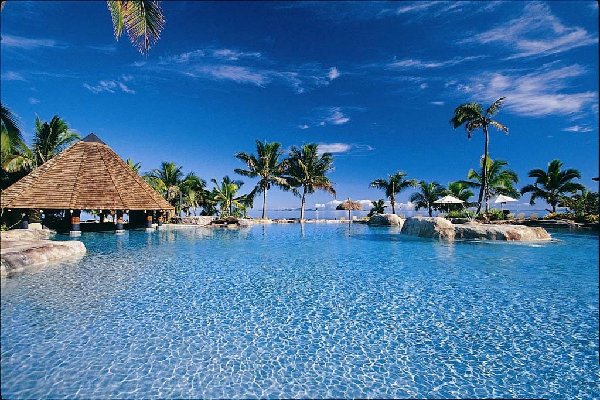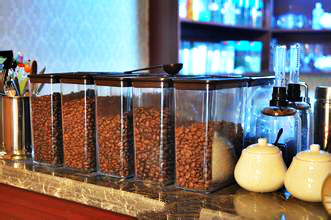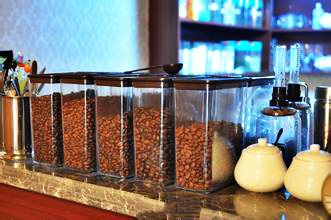The characteristics of island coffee beans in Bali, Indonesia the characteristics of Asian coffee beans
Indonesia-Bali
BaLi, a famous tourist area in Indonesia, is an island in the small Sunda Islands east of Java, with an area of more than 5560 square kilometers and a population of about 2.8 million. Bali west from the capital Jakarta about 1000 kilometers, and the capital Jakarta is located across the sea from the island of Java, only 1.6 kilometers away.
Because the island is located in the tropics, and affected by the sea, the climate is mild and rainy, the soil is very fertile, the four seasons are green, the flowers are in full bloom, and the trees are towering. Bali people love flowers and are decorated with flowers everywhere. Therefore, the island is known as "Island of Flowers" and enjoys the reputation of "Paradise in the South China Sea" and "Immortals Island". Most of the island is mountainous, with vertical and horizontal mountains, high in the east and low in the west, with four or five conical complete volcanic peaks, of which Mount Argonne (Bali Peak) is 3142 meters above sea level, which is the highest point on the island. Nearby is the Badur active volcano, which erupted in 963.
When it comes to coffee in Bali, Indonesia, we only know that Golden Rabbit Coffee is an old brand of Indonesia. The coffee in Bali is quite special and is called Golden Coffee. It is made by grafting the roots of Arabica coffee trees and the branches and leaves of coffee grown by Robosta. It is famous for its golden color, rich aroma and low caffeine.
However, Bali does not only have golden coffee, a hidden coffee that surpasses many well-known Central American estates is quietly loved by locals.
Arabica beans from the Kintamani volcano area of Ubu Indonesia Bali Karana Kintamani Ubud Natural, Bali, a small literary town in the hidden world.
A brief introduction to Wu Bu
Ubu used to be a small village, with lively bazaars and minibus stops in the center of the town, as well as Ubu Imperial Palace and main monasteries. Bedulu around Ubu is home to the Elephant Grottoes (Elephant Cave), which is the only grotto temple site in Bali and consists of three parts: the Elephant Grottoes itself, the Holy Spring Pool and the Buddhist architecture site. The serene and beautiful pastoral scenery and ubiquitous artistic atmosphere here make Westerners feel strange. Arts and crafts shops and many famous museums all over the streets show the cultural heritage and artistic heritage of Bali to the world through painting, sculpture, music, dance, textile, photography and other forms.
Sunshine, rain, forests, cliffs, river valleys, volcanoes, rice fields. Nowhere else can hotels be so loved and blessed by the gods as those near Ubu, hidden quietly in the valleys and by the banks of the river, not to mention comfortable and intimate service and delicious food. These hotels in the mountains restore all our dreams and aspirations for living in the mountains.
In the traditional culture of Bali, coffee is used as a cheap beverage raw material. The flavor and quality of the region have been unstable or depressed, and most of them have become cheap commercial beans. Barista Rodney and his partners decided to change the local people's stereotype of coffee. They chose Wubu Market, the cultural center of Bali, to open the island's only boutique cafe. Rodney and two other partners themselves have also obtained the international general coffee Q certification to check the quality of their own coffee, and it is also the only local cafe with this certification. The cafe has two bean dryers from 1kg and 4kg, and all the coffee in the shop comes from high-quality raw beans from the local or nearby producing areas (for example, Java, Sulawesi, New Guinea, Florus) and so on.
The success of the cafe has given them more motivation to pursue high-quality coffee sources. a few years ago, local coffee beans in Bali were processed by farmers in the Kintamani mountainous areas. however, regardless of weather factors, berry quality, post-production environment and other factors, it is always difficult for them to master the quality of raw beans in the past year.
Since 2015, Rodney has decided to build its own processing plant next to its vestibule and cafe. When the harvest season came last year, they went to the Jintamani area at an altitude of 1400 meters to buy high-quality coffee berries, and then carried them to the stable Wubu district of Tianhou 800m for post-processing.
This year, Rodney successfully experimented with three different batches, including water washing, honey treatment, sun treatment, and three different methods. The flavor greatly exceeds the general batches of origin, and the overall defect rate and uniformity are even better than those of fine beans in Central America. Water washing and honey treatment have bright and complex acidity, and the sun treatment batches are much better than those of Panama Manor. There are more ripe peaches, pineapples, mangoes and other tropical fruits, fruit wine aromas and finish.
Flavor description: raw beans exude strong cantaloupe and tropical fruit aromas; the entrance flavor changes to the sweetness of pineapple and strawberry jam, showing smooth and rich acidity at medium and low temperatures, with aromas of handmade black sugar, exquisite dark chocolate and hazelnut; the overall flavor is excellent, like syrup-like texture and sweet taste, the ripe fruit flavor of the sun even surpasses many well-known Central American estates.
[country]: Indonesia
[producing area]: Kintamani volcanic area
[altitude]: 1400 m
[harvest season]: June to September every year
[treatment]: insolation
[variety]: USDA, Karka, Smuri 795
[treatment plant]: Wubu treatment plant
[flavor]: ripe peach, pineapple, black sugar

Important Notice :
前街咖啡 FrontStreet Coffee has moved to new addredd:
FrontStreet Coffee Address: 315,Donghua East Road,GuangZhou
Tel:020 38364473
- Prev

The coffee network recommends the sun in the Ubu processing plant of Karana Kintamani volcano in Bali, Indonesia.
In the traditional culture of Bali, coffee is used as a cheap beverage raw material. The flavor and quality of the region have been unstable or depressed, and most of them have become cheap commercial beans. Rodney and his partners decided to change the local people's stereotype of coffee. They chose the Wubu Market area, the cultural center of Bali, and opened the only one on the island.
- Next

The coffee network recommends Guatemala Vivetnam fruit producing area coffee beans high-quality Guatemalan single beans.
The Republic of Guatemala (Spanish: Repblica de Guatemala), translated by Taiwan as Guatemala, is a country in Central America, located in the south of the North American continent. It borders the Pacific Ocean to the west, the Caribbean Sea to the east, Mexico to the north, Belize to the northeast, and Honduras and El Salvador to the southeast. Guatemala produces about 3.5 million bags of coffee every year.
Related
- Does Rose Summer choose Blue, Green or Red? Detailed explanation of Rose Summer Coffee plots and Classification in Panamanian Jade Manor
- What is the difference between the origin, producing area, processing plant, cooperative and manor of coffee beans?
- How fine does the espresso powder fit? how to grind the espresso?
- Sca coffee roasting degree color card coffee roasting degree 8 roasting color values what do you mean?
- The practice of lattes: how to make lattes at home
- Introduction to Indonesian Fine Coffee beans-- Java Coffee producing area of Indonesian Arabica Coffee
- How much will the flavor of light and medium roasted rose summer be expressed? What baking level is rose summer suitable for?
- Introduction to the characteristics of washing, sun-drying or wet-planing coffee commonly used in Mantenin, Indonesia
- Price characteristics of Arabica Coffee Bean Starbucks introduction to Manning Coffee Bean Taste producing area Variety Manor
- What is the authentic Yega flavor? What are the flavor characteristics of the really excellent Yejasuffi coffee beans?

